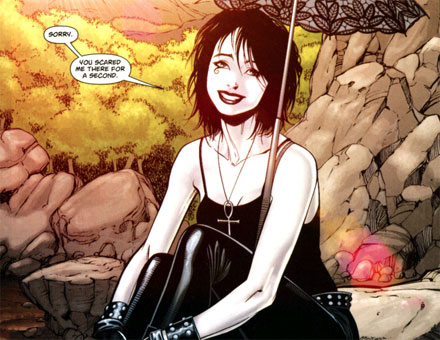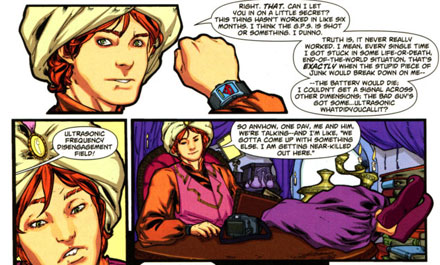GRAEME: I agree, to an extent, but I think Cornell addresses that in the story itself. This isn’t “regular” Lex, but a Lex who’s off because of his post-Orange Ring need that’s making him desperate and rash, instead of his usual manipulative genius self. It might be a weak excuse to write the character Cornell wants, but it’s one I’m willing to buy into, because each issue is enjoyably fresh and free of the angst found elsewhere in the DCU these days (plus, I think Robot Lois is my new comic book crush). What I’m finding, the more this run goes on, though, is that as much as I enjoy each individual issue, the storyline as a whole feels really piecemeal and choppy. I get that each issue has a new villain, and stands alone to an extent, but the whole quest seems to be really confusing in terms of how it goes from one location to the next between issues. Maybe I’m wrong, though; I might just need to sit down and re-read all of the issues together.

Also: Sean Chen’s work was nice enough – especially on the sequence where Grodd tries to eat Lois – but I missed Pete Woods this time out.
DOUGLAS: Yeah, I missed Pete Woods too: his character acting is subtle, but it really kept the first few installments moving. Chen’s work here is functional, but also pretty generic–I don’t think I realized how much Woods added to the overall tone of this story until he ducked out for a spell.
EVAN: You know, the recent trend of back-ups has kind of rankled me. I’ve felt like they’ve been used as stopgaps for creators who can’t fulfill their deliverables (ugh, I know) or as half-assed tryouts. But, to me, the Jimmy Olsen back-up actually outclassed the lead story. That’s impressive, given how good Cornell’s run has been. The trick that Spencer nails is that this Jimmy feels of the moment but not like any of the story is trying too hard. And as the gaming contributor here, let me give props for good video game references in a comic book.
(More on Techland: The Comic Book Club: Wonder Woman and Action Comics)
As for the main story, I really like latter-day Grodd. Johns’ re-invention of him in his Flash run was a little horrific, so it’s nice to see Cornell’s take on the big ape be leavened by a little humor.
Oh, and that panel where Lois-bot watches the other android get de-activated? That’s what we call foreshadowing, kids.
DOUGLAS: I don’t think I’d actually read anything by Nick Spencer before the Jimmy Olsen backup here (although now I’m dying to read Morning Glories, any of y’all got something to say about it?), but I liked it a lot. Spencer’s got a lot of “newish comics writer” tics–chiefly cramming Claremontian word-counts into every panel and stretching for topical gags–but this has a lot of nutty energy about it, and a clever cliffhanger. Mostly, I’m happy that this Jimmy isn’t the hard-boiled but callow glyph we’ve seen in the past few years; the interpretation here owes a bit to All-Star Superman, I think–the guy who’s a flamboyant jerk in a lot of ways, but who’s also Superman’s best friend because he’s brave, funny, and (most importantly) totally unafraid of personal transformation.
MIKE: I really enjoyed it too. Spencer does a good job of poking fun at the Superman signal watch. That’s a bit of Superman history I could live without, especially with the constant ratcheting up of Supe’s power levels. (Did anyone watch the DCU video game trailer where he hears Wonder Woman cry out on Earth while he’s floating far off in space? C’mon.) Spencer’s Morning Glories isn’t quite as tightly packed, but it is high on mystery. That series counts LOST as its main influence and it shows.

There’s no doubt that Jimmy is going to save Metropolis (Earth?) from the invading alien armada. The question will be how Spencer will pull it off. I’m going to call that Jimmy will dress up in some kind of uniform/costume and either bluff them or go pure bravado and use heavy-handed diplomacy. All in the name of getting Chloe back.
GRAEME: Yeah, I really enjoyed this one as well. It’s got a nice mix of fun – I almost said innocent fun, but that’s not entirely right, because there’s a certain knowingness even to the Genie sequence that starts the whole thing off – and meta-commentary on the state of Jimmy as a character. I get the Morrison/All Star Superman influence, but there’s also some work here that’s very reminiscent of what Joe Casey was trying to do with the character way back when he was writing Adventures of Superman, way back in… 2001, perhaps? 2002? I like that there’s no doubt that Jimmy will save the world, either in the reader’s mind or the character’s; it’s all about the lengths he’ll go to to do so, which shifts expectations in a nice direction. Here’s hoping later episodes live up to this one.

